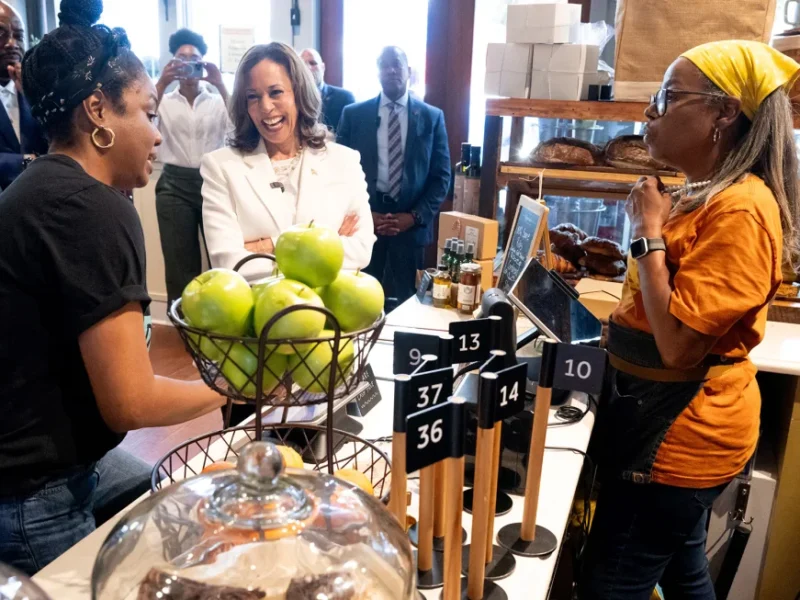Vice President Kamala Harris is preparing to introduce several new incentives for entrepreneurs and small business owners to encourage the creation of millions of new businesses, as part of a second wave of economic proposals set to be unveiled on Wednesday.
In her upcoming speech in New Hampshire, Harris will advocate for expanding a tax deduction for business startup costs and eliminating certain regulatory barriers, such as filing requirements and operational licenses, for businesses below a specific size, according to a campaign official. This strategy is aimed at appealing to middle-class voters, a key demographic that could bolster her electoral chances.
Harris recently mentioned the forthcoming tax credit to a small business owner in Savannah, Georgia, saying, “This is one of my singular priorities, is to invest and grow our small business.” Currently, small businesses can deduct $5,000 for startup expenses in their first year, according to the Congressional Research Service. Harris plans to propose increasing this deduction to $50,000, reflecting the average startup cost of around $40,000.
Harris also aims to surpass the creation of 19 million new businesses under the Biden administration with a new target of 25 million.
Following an initial wave of populist policies that increased government involvement in areas like retail pricing and housing, Harris is now focusing on a pro-business, low-regulation approach to counter Republican critiques. Advisors suggest she will also adopt a stance traditionally associated with conservatives by branding herself as fiscally disciplined.
On the campaign trail, Harris is expected to argue that revenue from reversing certain provisions of the 2017 Tax Cuts and Jobs Act should fund community-level investments and programs that directly impact Americans. One close adviser mentioned that Harris believes the government should “use those expiring tax cuts to address issues that affect the average American’s financial well-being.”
Small business growth tops her agenda, alongside investing in underserved communities and supporting working families, as previously reported by CNN.
Community-based lending
Harris is set to propose a new, unspecified fund aimed at helping the smallest banks manage interest expenses on loans for emerging businesses. During her time as senator and vice president, Harris has advocated for financial support to these banks to boost investment in startups beyond major urban centers. Notably, she has championed legislation that allocates funds to Community Development Financial Institutions (CDFIs), which focus on supporting low-income communities often overlooked by traditional lenders. Many small businesses, especially those owned by people of color, faced significant challenges during the Covid-19 pandemic.
On Wednesday, Harris will push for additional funding for these banks.
Deputy Treasury Secretary Wally Adeyemo, who has collaborated with Harris to expand capital access nationwide, emphasized the importance of CDFIs in providing loans to new businesses without established financial histories. He noted that new ventures often struggle to secure loans due to a lack of a three-year financial track record, even if they approach multiple banks.
Adeyemo also pointed out that interest rates, which have increased for all businesses in recent years, are disproportionately high for smaller companies, making borrowing costs prohibitive even if loans are available.
“Ultimately, the cost of capital is a critical factor,” Adeyemo remarked.
Prior economic proposals of Harris
The recent small business initiatives follow Harris’s earlier release of a four-part plan aimed at reducing the costs of housing, groceries, child care, and health care. Many of these new proposals build on existing Biden administration efforts.
To improve home affordability, Harris proposes offering up to $25,000 for down payments and a $10,000 tax credit for first-time homebuyers. She also plans to introduce tax incentives for builders of starter homes for first-time buyers and expand tax breaks for affordable rental housing. Additionally, she aims to prohibit the use of algorithm-based tools by landlords to set rental prices.
For groceries, Harris is advocating a federal ban on price gouging to lower costs, although specifics on this proposal are limited.
Harris also seeks to reinstate the American Rescue Plan’s expanded child tax credit, which increased to $3,600 from $2,000, and make it permanent. She proposes a new child tax credit of up to $6,000 for middle-class and lower-income families with infants.
Regarding health care, Harris wants to broaden the current $35 monthly cap on insulin costs and the upcoming $2,000 annual limit on out-of-pocket prescription drug costs to include all Americans, not just Medicare recipients. She also plans to extend the Affordable Care Act’s enhanced premium subsidies beyond their 2025 expiration and speed up Medicare’s negotiations on drug prices.











